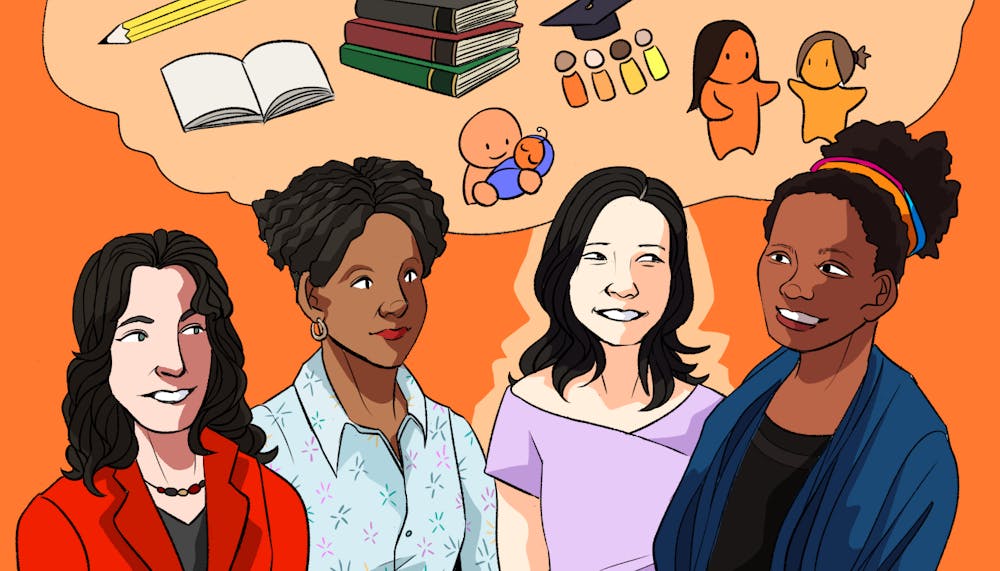As Women’s History Month comes to an end, we want to highlight literature curated by some of the University’s incredible female faculty. So many women at the University are not only advancing breakthroughs in their respective fields, but also translating their lived experiences into words that inspire, move, challenge, and encourage others.
Faculty members have been asked to navigate an unforeseen academic year in the midst of a racial reckoning. Despite the challenges that came with shifting online, connecting with students, and confronting societal tensions, female faculty at the University have continued to channel their passion into teaching and creating.
To bring the celebration of women and their contributions to culture, history, and society to The Daily Princetonian, we spoke to a few of the many inspiring female authors working at Princeton on what it means to be a professor, writer, and mentor during these turbulent times.
While these authors work in fields as diverse as engineering, literature, and social policy, their experiences highlight elements of commonality that have shaped their personal perspectives. These women discussed the balance of work and motherhood, the traditional split between storytelling and academic writing, and their advice to the next generation of female authors.
With words of encouragement and stories of perseverance and compassion, this impressive contingent of professors offered a poignant perspective on the work of female academics.

Anne Cheng ’85, professor in the Department of English and the Programs in Gender and Sexuality Studies and American Studies, has certainly been around the block at Princeton. Cheng pursued English and creative writing as a Princeton undergraduate, and then received her master’s in English and Creative Writing from Stanford University and her Ph.D. in Comparative Literature from the University of California at Berkeley. Cheng later returned to Princeton to teach in the very department she studied in as an undergraduate student. Now, as a professor, she describes being back in the classroom as feeling very much like walking down memory lane as she recalls the mentors who enabled her to explore creative writing at Princeton.
Namely, Cheng recalls being “struck by professor Maria DiBattista” in the English department — “a confident and dynamic figure who quickly demonstrated the possibilities that exist for women in academia.” Empowered by DiBattista’s sharp and confident teaching style, Cheng, who comes from a family of theoretical physicists and scientists, discovered that writing could be a lifelong vocation for her. Thinking beyond her relationship with DiBattista, Cheng fondly noted, “Many women in my life allowed me to see a part of myself that I didn’t know that I had.”
As an undergraduate student, Cheng did not think much of the so-called “glass ceiling” or the depth of the limitations that constrain women of color. However, for Cheng, the limitations and biases imposed on women’s experiences are difficult to ignore. After speaking with both students and members of the literary community about her literary works, Cheng said she quickly realized that, “As I get older, it becomes more clear that being a woman of color are not just peripheral categories of my life, but rather indicative of how I am treated by this world.”
It is this very cross section of race and gender that has fueled Cheng’s academic interests as well as her literary endeavors.

She stated, “I started writing more and more about racialized gender, which has become more clear as a force that both defines me and fails to define me.”
Cheng has also been able to extend her literary interests by teaching courses, which specialize in psychoanalytic theory and race studies in 20th-century American literature. This semester, she is teaching ENG 216: Wounded Beauty, a course that pushes students to reflect on beauty as a social construct imposed on individuals of differential cultural and racial backgrounds.
Ruminating on the challenges that she has faced as a writer, Cheng also stressed that she is an individual who writes slowly.
“I’m one of those people who can spend months on sentences,” she said, “partially because writing is the way for me to think.” In essence, the page becomes not only a space for writing, but also one for deliberating and pondering — for grappling with and thinking about the dimensions of personhood and femininity.
Through this writing process, Cheng discovered her passion for both creative and academic writing. While the two branches of writing are branded as disparate, Cheng stated, “Research and creativity are not two different things. The ability to process academic information requires a great deal of creativity; I feel like I am creatively satisfied when I write scholarly pieces.”
Cheng’s advice for aspiring writers? Regardless of the form of writing you dabble in, “writing always belongs to you.” But, in order to acquire this sense of belonging, Cheng stressed that one must start and continue to write. Finding and projecting your voice through language takes time and patience.
Finally, Cheng is incredibly excited to be teaching two courses next fall: AMS 101: America Then and Now, a gateway course for the American Studies certificate, and ENG 293: Chinatown, USA, an English course that delves into the intimate relationship between American domesticity and the foreigner within.
Note from the writers: These models of female creativity and ability underscore the depth of experience within Princeton’s accomplished community. Though we highlight their words and works now, their achievements continue to engage and inspire even when underrecognized. They remind us that finding your voice, regardless of the form it takes, is crucial as we work towards a world that derives strength from women’s words and actions. Thus, we urge you to carve out spaces for self-expression and recognize the power your words can hold.








